- Home
- Lloyd Alexander
The Gawgon and the Boy Page 8
The Gawgon and the Boy Read online
Page 8
"Father's," my sister said. "That's right. He owns it. He lets her live there free, but it's still his house. He buys stocks for her, too. That must be what he and Uncle Rob were talking about.
"Father will take care of everything," she went on. "Anyhow, it's got nothing to do with blighters. It's none of your business."
My sister knew the hallways and back stairs of the adult world, so I believed her. But if it was none of my business, all the more reason to make it so. Next time I saw The Gawgon, I asked her to explain the puzzling crash. She tried her best; still I did not grasp it, only that it was not good.
"No, it isn't good," The Gawgon said. "Something like it happened before, years ago, and that was very bad, too. It all worked out in the end. I hope it works out again. President Hoover says it will. But when politicians promise everything's going to be rosy, I start feeling my pockets."
I let it go at that. I would make it my business some other time. I had enough crowding my head. As threatened, The Gawgon dipped me into geometry. If this was supposed to teach me to think, it felt more like frying my brain. The notion of pi, a number that could stretch out endlessly, bewildered me. But at least I was good at drawing circles.
The Gawgon could sense when my mind wandered hopelessly beyond her reach. To give me some relief from theorems and propositions, she handed me a book of mystery stories.
"Better than just mysteries," she said. "Sherlock Holmes can show you how to pay attention to details and figure things out logically.
"Arthur Conan Doyle started out as a doctor," The Gawgon said. "He wrote to pass the time between patients. Since he didn't have a lot of patients, he ended up writing a lot of stories. His old professor was his inspiration for Sherlock Holmes, the world's greatest consulting detective."
It wasn't long before I was so captivated by Sherlock Holmes, I half believed he and his companion, Dr. Watson, really existed.
"They do," she said. "In your imagination." Though devoted to him, I decided Holmes was not the world's greatest consulting detective. Second greatest. First was: The Gawgon.
THE AFFAIR OF THE SEATED KING
The dense fog, which makes London infamous throughout the world, was so heavy as to be impenetrable. The entire city lay immobilized. Horses balked at pulling their hansom cabs. Police constables, attempting to walk their beats, became hopelessly lost and confused. The crowded streets were now deserted. Thieves and pickpockets, who normally thronged Belgrave Square and Piccadilly Circus, remained within their sordid lairs.
Unusual even by London standards, the fog discouraged us from taking our afternoon stroll in Kensington Gardens, and so The Gawgon and I chose to stay in our apartments, with a cheery coal fire in the grate, and amused ourselves by solving problems in geometry.
The Gawgon found the square of the hypotenuse to be especially droll and entertaining. We were chuckling over it when Miss Florry, our smartly attired housekeeper, announced the arrival of a gentleman identifying himself as Mr. Hemlock Soames. Without waiting for permission, this individual brushed past Miss Florry and entered our sitting room.
"I pray you will forgive this unconscionable intrusion." The unexpected visitor removed his black bowler hat and made a courteous bow. He was tall and lean, almost gaunt. A pair of prince-nez spectacles bridged the high arch of his nose. His pale brow seemed to radiate a cool inner light.
"It is all the more unpardonable."-his quick eyes scanned the papers on the writing table "since I observe you and your colleague are deeply engrossed in the square of the hypotenuse, which I myself always find a most enjoyable diversion.
"Be sure," he added, "only a matter of extreme urgency brings me to impose my presence so rudely upon you."
The Gawgon, in a watered-silk dressing gown, approached him and shook his hand, and with her usual graciousness, invited him to sit in our best upholstered armchair.
"Before you reveal your difficulty," said The Gawgon, "it is essential to deal with each other in total frankness.
"You, I have reason to believe," she went on, offering him a goblet of soda water, "are endeavoring to practice a small deception upon us."
The gentleman startled and choked on his soda water as The Gawgon continued:
"I detect a slight West Indian accent in your speech. Jamaica rather than Trinidad; Kingston rather than Montego Bay. But, as well, I hear a charming musicality unique to that great American metropolis Philadelphia. Curious combination. It is possible, of course, that you have traveled or resided in those areas. A diplomat? A statesman? No, I discern too much intelligence in your features. You have, perhaps, assumed these accents for misleading purposes.
"Also, you appreciate the subtle joys of the square of the hypotenuse; therefore, I doubt that you are an ordinary plainclothes policeman in the employ of Scotland Yard.
"More conclusively," went on The Gawgon, "I notice an odor-I refrain from calling it a stench-of pipe tobacco about your person. A private blend of Latakia and Egyptian? Further, when shaking your hand, I felt a small callus near the second knuckle of your index finger, caused, I hypothesize, by long use of the bow for a stringed instrument. Were I to examine your left hand, I am convinced I should find other calluses on your fingertips. You play the cello, violin, or viola-most likely, the violin.
"Finally, with the exception of myself, only one person knows every inch of London so well that he could make his way blindfolded-or, in this case, fogbound.
"For the sake of accuracy, I prefer to address you by your true name: Mr. Sherlock Holmes."
"Touche!" exclaimed Sherlock Holmes. "My compliments. I consider myself-I do not indulge in false modesty-a master of disguise. I should have known The Gawgon would see through my masquerade."
"Now that your identity has been established," said The Gawgon, "allow me to inquire: Why did you come disguised in the first place?"
"I was obliged to do so," replied Holmes. "There are always watching eyes and listening ears. If it became known that you were associated with me in any way, or that we have so much as spoken together, your life would be at risk as well as mine. For your own protection, I dared not take the chance of being recognized. I must warn you in advance: This affair is dangerous in the extreme."
"Risk, my dear sir, is what makes life interesting," said The Gawgon. "Now, I trust, you will explain the nature of this perilous situation."
"To put it briefly," replied Holmes, "after long and difficult negotiations, the Greek government has finally consented to lend the British Museum, for exhibition, its rarest and greatest treasure.
"It is a life size statue, the ultimate masterpiece by that sublime sculptor, Phidias. You are familiar, of course, with the mythical hero Perseus, who brought the head of Medusa to King Polydectes. At sight of it, the king was instantly turned to stone.
"The statue represents the king, seated on his throne, reaching out a hand to receive Medusa's head. The throne, alas, has not survived the ravages of time, but the figure is intact.
"It is superb," Holmes went on. "A glory of classical antiquity, a consummate work of art. Its value-beyond price. The ministry in Athens, reluctant to lend it in the first place, is profoundly concerned for its safety."
"Understandably," said The Gawgon. "If any harm were to befall this treasure, I foresee that Greece would be outraged, even to a point of threatening war. The Balkans, naturally, would be drawn in; the Russians would take a hand; the French could not resist meddling, which would stir up the Austrians and Prussians. In effect, a catastrophe. The object must be protected at all cost."
"You analyze it perfectly;" said Holmes. "One thing I have not mentioned: The statue has already been stolen."
14 My Uncle Santa Claus
The following Thursday, everyone ate Thanksgiving dinner at my grandmother's: a very good dinner, as it always was. My mother declared we had a great deal to be thankful for: We were better off than a lot of people; we were indoors eating instead of outdoors starving; and things could be worse. This, o
f course, was absolutely true and we were grateful. Still, nobody was having much of a laughing time. My father and Uncle Rob sat deep in conversation. My sister, bored, would rather have been with her Tulip Garden. Aunt Marta dozed in a chair, never attempting even a chorus of "Sari Marais." The Gawgon, suffering a touch of indigestion, went to her room. Uncle Will, who had another engagement, left right after the mince pie. The only one in good spirits was Uncle Eustace. The raw weather had perked up the tombstone business; he was close to being lighthearted, and he had forgiven my father for feeding him the Mexican jumping beans.
In the kitchen, my mother, grandmother, Aunt Rosie, and Aunt Florry did the dishes. My work was to dry the silverware, a task that for some reason I disliked, and I was impatient to be done. Aunt Florry, usually brisk in washing up, was slow about it and, at one point, stopped altogether.
"I'll tell the men later." Aunt Florry kept wiping her hands on her apron. "Will can explain more when he comes back.
"Mrs. Heberton had to let us go."
"What? Fired?" Aunt Rosie burst out before my grandmother could say anything. "Both of you? After all these years, just like that? Ha! There's your high muckety-mucks, riding rough shot over everybody!"
"Oh, Florry, this is too bad." My grandmother put her arms around her. "Why? What happened? I never thought for a moment."
"She couldn't help it," Aunt Florry said. "She certainly didn't want to. She's been talking with Mr. Ormond at her bank; he takes care of all her business. He's doing his best for her, but she'll have to close the house and try to sell it when the market's better. She can't afford to keep it up, least of all paying a companion and a chauffeur."
"With her money?" retorted Aunt Rosie.
"Not anymore," said Aunt Florry. "She'll be lucky if she comes out with a penny to her name. Until things turn better, she's going to live with her son in New Jersey."
"Serves her right," Aunt Rosie declared. "That's mean, firing people at the holidays."
"No, she was very generous," Aunt Florry said. "Mrs. Heberton paid us to the middle of January. She didn't have to do that. She knows a lot of people, she promised she'd ask around and see if she could find jobs for us.
"I feel so bad for Will," Aunt Florry went on. "He was happy there, driving the car and looking after the grounds. He never touched a drop when he was working."
"If you need a place to stay," my mother began.
"You'll stay here," my grandmother told Aunt Florry. "In Jack's room. I still don't have the heart to rent it to strangers. I'll fix up something for Will, too."
Everybody went home soon after. We walked the few blocks to Lorimer Street; my mother thought the exercise would be good for our digestion. My father and mother talked between themselves. My sister, sulking, trudged behind.
It began to drizzle; the streetlights were pale smears. Most of the neighborhood street lamps, in those days, were gas. Just before sundown, a man came with a lighter on the end of a pole; mornings, he came back and snuffed out the flame. Now, with the mist swirling around the alleyways, it was the ideal place for lurking assassins; and Sherlock Holmes's mortal enemy, Professor Moriarty, was probably stalking us. I turned into the shadows of Lorimer Street as if I had never been there before.
AN EXPENSIVE TAILOR
You Holmes said flatly, "the priceless statue of King Polydectes has been stolen. It was stored in the basement of the British Museum for minor cleaning and restoration. Now it has vanished. The theft, so far, has not been made public, but you understand the consequences if its disappearance is revealed."
"And you, sir," I put in, "must find out who stole it."
"Of course not," said Holmes, with some asperity at my naive remark. "I know that fact already.
"I have, an hour ago, received a message from the perpetrator," Holmes went on. "A taunting communication, indeed. He boasts that he has planned it all in advance. He chooses to toy with me and play a vicious game. He challenges me to recover the statue within twenty-four hours.
"Otherwise, he will send an open letter to the Times and all foreign embassies, thus lighting the fuse of the European powder keg. Worse, when the disaster is revealed, London's thousands of painters, poets, novelists, and other devoted art lovers will riot in the streets. A terrifying prospect.
"Scotland Yard is incompetent to deal with the case," Holmes continued. "The blame will be laid on my failure."
"Diabolical!" I exclaimed. "What fiendish intelligence conceived such a plot?"
"One man," replied Holmes. "That individual who tirelessly seeks my destruction, who has already tried to murder me: Professor Moriarty." The Gawgon nodded. "The Napoleon of crime."
"None other," said Holmes. "When you observed that only you and I could make our way through London's worst fog, you should have included Moriarty and his hirelings. Nothing keeps them from their loathsome business."
"Very possibly he means to draw you out and strike at your person," The Gawgon said, "but it would merely add a little icing to his poisonous confection: desirable but not essential. Destroying your reputation is far crueler than destroying you corporeally."
"I am aware of that," said Sherlock Holmes. "Alas, my staunch companion, Dr. Watson, has been called away for a fortnight in Wolverhampton. My brother Mycroft, though a genius, is preoccupied with philosophical speculations. Nothing, not even the fate of the world, could induce him to venture from the reading room of his club. And so I turn to you for any suggestion or advice you may wish to offer."
"My suggestion is this," The Gawgon said, after a few moments of reflection. "Return immediately to your Baker Street apartments. Do not, in any circumstances, leave them until you receive word from us. My advice: Put this matter entirely in the hands of The Boy and myself."
Although Holmes protested, unwilling for us to risk our lives, he at last, and most reluctantly, agreed. Once the great detective had left our premises, The Gawgon went to her filing cabinet, where she riffed through the folders.
"Ah, yes, here it is: the key to a secret entrance of the British Museum." She winked at me. "I doubt that even Mr. Sherlock Holmes has such a means of access."
From her wardrobe of disguises, she outfitted us with black bowler hats, dark suits, tightly furled umbrellas, and Old School ties.
"From among the thousands of merchant bankers and stockbrokers wearing this identical garb," she said, "it will be impossible for Moriarty to pick us out." I mentioned she had neglected to take revolvers from her extensive arsenal.
"If my hypothesis is correct, firearms will not be necessary," she said. "Come along, Boy. The game's afoot."
In the streets, we made our way unerringly through the enveloping fog. Arriving at the rear of the British Museum, The Gawgon produced her key and opened a narrow door. We went swiftly down the empty corridors lit by the occasional gas jet. As familiar with the bowels of the British Museum as she was with our own apartments, The Gawgon entered a room where various implements covered a worktable.
"Yes, the statue was brought here and set on this bench." The Gawgon lit a gas lamp, took a magnifying glass from her pocket, and scrutinized the area.
"I see traces of parallel lines on the floor," she said. "As Euclid points out, parallel lines do not meet, and so I assume these tracks continue." I had, in the meantime, noticed a crumpled scrap of paper under the worktable. I hurried to pick it up and hand it to The Gawgon. She smoothed it out and studied it closely.
"Well done, Boy. This is a better stroke of luck than I could have hoped. Even a master criminal has moments of carelessness. It makes my work much easier, for the pieces of the puzzle now begin falling into place. This may confirm what I privately theorized from the start.
"It is a bill, quite a large bill," said The Gawgon, "from Houndstooth & Son, the most elegant and expensive tailors on Savile Row. I believe, Boy, it tells us all we need to know."
"Will wants to be Santa Claus," my grandmother said, later that day. My mother and Aunt Florry were back from shoppin
g on Fifty-second Street. I had just come down from The Gawgon's room and was as surprised as they were. Uncle Will had not been Santa Claus for several years now.
"If he'd like to," my mother said, "of course, let him do it."
"Do we still have the suit and the beard?" asked Aunt Florry. "Packed away. I'll air them out," my grandmother said. "It was Will's idea," she added. "He wants this to be a good Christmas."
When I still fervently believed in him and loved him, Santa Claus always came to visit. We would gather in my grand mother's parlor to wait for him on Christmas Eve. Uncle Will would always be there, eager as the rest of us, but he kept looking at his wristwatch.
"He's late," Uncle Will would say at last. "I have to run an errand. I'll be right back."
"Better hurry," my grandmother warned, "You don't want to miss him."
Uncle Will put on his hat and coat and left the house. I was fidgety, afraid he might not come back in time. But-and it happened fatefully every year-after about twenty minutes, there were loud knockings at the door.
"Santa Claus? My goodness!" My grandmother clapped her hands to her head. "And Will's not here!" She opened the door. Santa Claus came rolling in, red suited, with bouncing belly, a white beard up to his eyes, a sack over his shoulder. He boomed out some ho-ho-hos, then suddenly stopped.
"Someone's missing." Santa Claus glanced around. "I don't see Will." My grandmother explained that Will had gone on a short errand. Santa said he would catch up with him later. He heaved himself into an armchair; my sister and I sat on his knees while he fished out small presents from his sack, which looked suspiciously like a pillowcase.
We begged him to wait, Uncle Will would be here at any moment. But Santa had other stops to make; he bustled out with a flurry of ho-hos and Merry Christmases. Soon after, Uncle will came back. When he found out he had missed Santa Claus, he sighed' with huge regret.
"Next year," he said. "Next year for sure." It did not happen. He missed the visit every Christmas. But except for Uncle Will's annual disappointment, these were always magical evenings. In addition to the smells of mince and pumpkin pies, the sage and onions of turkey stuffing, another aroma floated in the air, the very essence of Santa Claus.

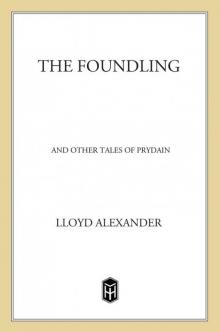 The Foundling and Other Tales of Prydain
The Foundling and Other Tales of Prydain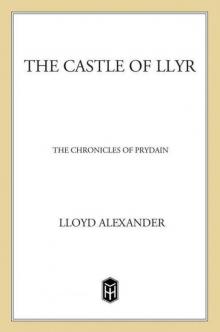 The Castle of Llyr
The Castle of Llyr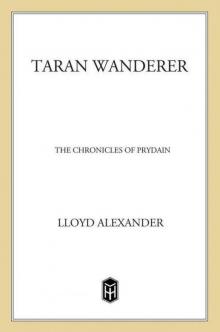 Taran Wanderer (The Chronicles of Prydain)
Taran Wanderer (The Chronicles of Prydain)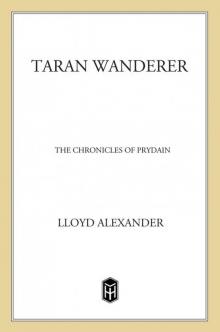 Taran Wanderer
Taran Wanderer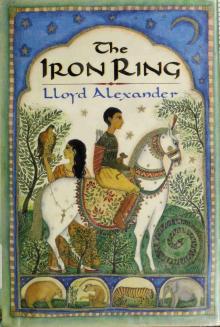 The Iron Ring
The Iron Ring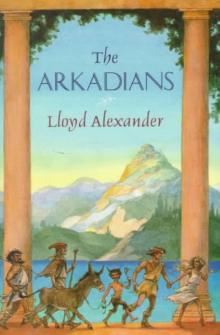 The Arkadians
The Arkadians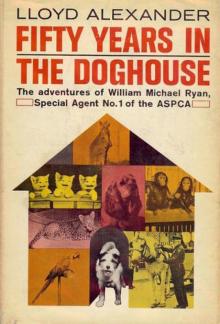 Fifty Years in the Doghouse
Fifty Years in the Doghouse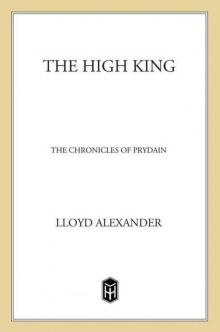 The High King
The High King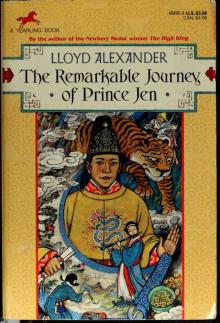 The Remarkable Journey of Prince Jen
The Remarkable Journey of Prince Jen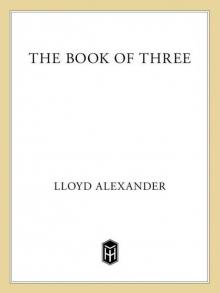 The Book of Three
The Book of Three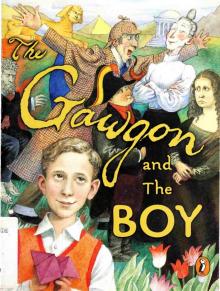 The Gawgon and the Boy
The Gawgon and the Boy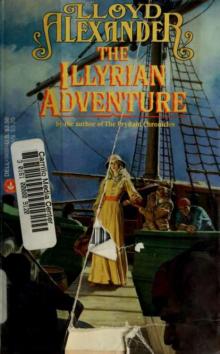 The Illyrian Adventure
The Illyrian Adventure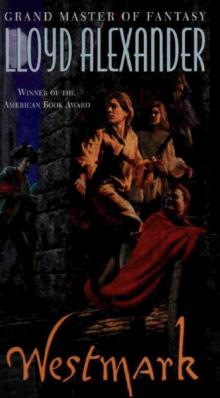 Westmark
Westmark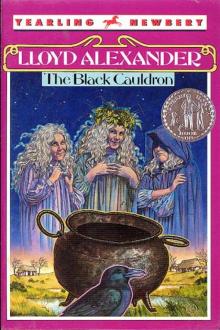 The Black Cauldron
The Black Cauldron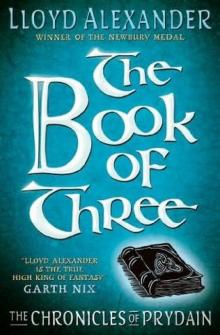 The Book of Three cop-1
The Book of Three cop-1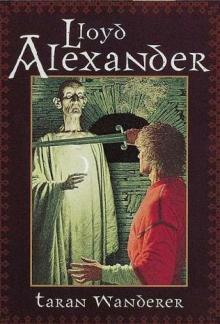 Taran Wanderer cop-4
Taran Wanderer cop-4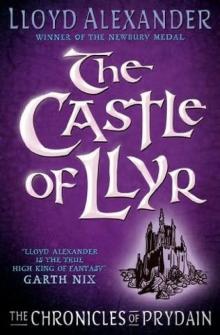 The Castle of Llyr cop-3
The Castle of Llyr cop-3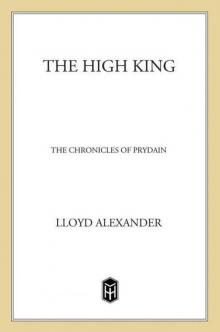 The High King (Chronicles of Prydain (Henry Holt and Company))
The High King (Chronicles of Prydain (Henry Holt and Company))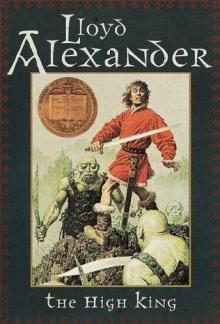 The High King cop-5
The High King cop-5 The Foundling
The Foundling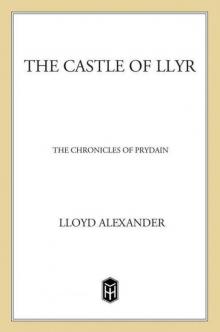 The Castle of Llyr (The Chronicles of Prydain)
The Castle of Llyr (The Chronicles of Prydain)